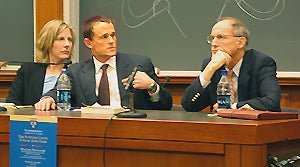The Harvard Law Review hosted its annual Supreme Court Forum on Wednesday, November 28, to discuss the most important developments of the Court’s 2006 term. In a discussion moderated by HLS Professor Martha Minow, panelists spoke about the historical significance of Parents Involved in Community Schools v. Seattle School District No. 1, in which the Court outlawed voluntary school desegregation policies in Seattle, Wash., and Jefferson County, Ky. last term.
Professor Martha Nussbaum of the University of Chicago opened the event by outlining her foreword to the November 2007 issue of the Harvard Law Review. She summarized the Court’s recent term by arguing that a majority of the justices turned away from a traditional “capabilities approach” to decision-making, which interprets laws to provide maximum protection of rights for citizens.
“The Roberts Court is…moving away from a realistic grappling with history and people’s actual struggles, toward something that is very competent and neat, but actually not very human,” Nussbaum concluded. “It really ducks a lot of the human questions that are not just interesting philosophical questions, but are actually questions prompted by the constitutional tradition itself.”
Professors Heather Gerken of Yale Law School, James Ryan of the University of Virginia School of Law, and the Honorable J. Harvie Wilkinson III of the Fourth Circuit Court of Appeals discussed their case commentaries, which are also published in the Law Review.
An expert on the role of diversity in democracy, Gerken focused on Justice Anthony Kennedy’s concurrence in the school desegregation case, in which he agreed with the majority that the Seattle and Kentucky school districts illegally used race to classify students but also said racial, ethnic, and economic integration should still be an important goal of the public school system. Gerken said this stance on race is contrary to Kennedy’s prior equal protection jurisprudence, and she offered an explanation.
“In evaluating the equal protection claims raised in Parents Involved, the novel portions of Justice Kennedy’s opinon focus not on race, but on…the exceptional role that public schools play in inculcating civic morality,” Gerken said. “It is a story about what students learn in school, not whether they have an equal opportunity to do so.”
Ryan, an expert in law and educational opportunity, said that while the case will not affect how schools operate on a day-to-day basis, the Court dramatically changed its stance on integration. Previously, the Court agreed with the goals of integration, but the recent desegregation case showed hostility towards desegregation as an important objective, he said.
As the only supporter of the Court’s decision in this case, Wilkinson said the decision was important because it challenged the continued importance of race in affirmative action and instead focused on other factors, such as economic class.
“In many ways, this is a challenge to think about society’s problems in a slightly different way…in terms of problems we need to address for everyone,” Wilkinson said. “In that sense, I think the Seattle decision was in fact liberating because it frees us in a very fundamental way to think about our human problems and our social problems in very non-racial terms.”
To read the full text of the recently released Harvard Law Review, click here.
